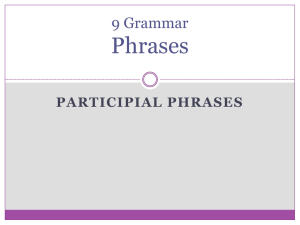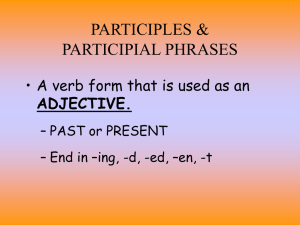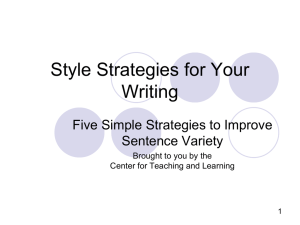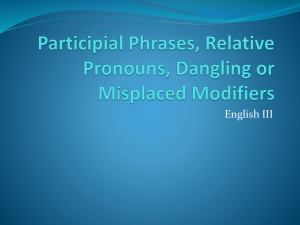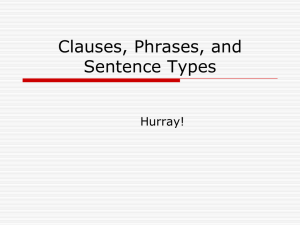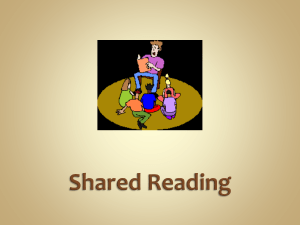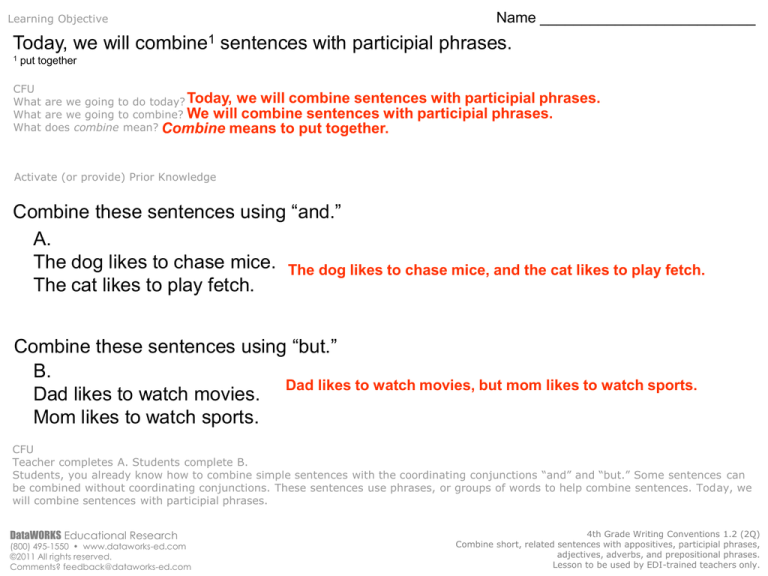
Learning Objective
Name __________________________
Today, we will combine1 sentences with participial phrases.
1
put together
CFU
What are we going to do today? Today, we will combine sentences with participial phrases.
What are we going to combine? We will combine sentences with participial phrases.
What does combine mean? Combine means to put together.
Activate (or provide) Prior Knowledge
Combine these sentences using “and.”
A.
The dog likes to chase mice. The dog likes to chase mice, and the cat likes to play fetch.
The cat likes to play fetch.
Combine these sentences using “but.”
B.
Dad likes to watch movies, but mom likes to watch sports.
Dad likes to watch movies.
Mom likes to watch sports.
CFU
Teacher completes A. Students complete B.
Students, you already know how to combine simple sentences with the coordinating conjunctions “and” and “but.” Some sentences can
be combined without coordinating conjunctions. These sentences use phrases, or groups of words to help combine sentences. Today, we
will combine sentences with participial phrases.
DataWORKS Educational Research
(800) 495-1550 • www.dataworks-ed.com
©2011 All rights reserved.
Comments? feedback@dataworks-ed.com
4th Grade Writing Conventions 1.2 (2Q)
Combine short, related sentences with appositives, participial phrases,
adjectives, adverbs, and prepositional phrases.
Lesson to be used by EDI-trained teachers only.
Concept Development
A participle is a verb form used as an adjective that describes a noun.
A Participial phrases is a group of words containing a verb form that always acts as an adjective.
A participial phrase can be used to combine short, related sentences.
When combining sentences, a participial phrase is set off by commas.
Examples:
There are two types of participles:
Verb
Participle
scare
past tense – scared
shrink
present tense – shrinking
Participial Phrase
scared by the movie
shrinking from the hot sun
The girl was scared by the movie. The girl began to cry.
The girl was scared by the movie. + The girl began to cry.
When a participial
phrase is added at
the beginning,
a comma is inserted
after the phrase.
Scared by the movie, the girl began to cry.
A participial phrase
must be close to the
noun or pronoun it
describes.
The participial phrase describes “the girl”
CFU
In your own words, what is participle? A participle is _______________________________.
In your own words, what is a participial phrase? A participial phrase is ____________________.
What does a participial phrase always act as? What does it describe?
When a participial phrase is added at the beginning of the sentence, where do you insert the comma?
Which is an example of a sentence with a participial phrase? How do you know?
DataWORKS Educational Research
(800) 495-1550 • www.dataworks-ed.com
©2011 All rights reserved.
Comments? feedback@dataworks-ed.com
a. Looking in the empty room, Rachel saw a big spider.
b. Rachel saw a big spider.
4th Grade Writing Conventions 1.2 (2Q)
Combine short, related sentences with appositives, participial phrases,
adjectives, adverbs, and prepositional phrases.
Lesson to be used by EDI-trained teachers only.
Concept Development (continued)
A participle is a verb form used as an adjective that describes a noun.
A Participial phrases is a group of words containing a verb form that always acts as an adjective.
A participial phrase can be used to combine short, related sentences.
When combining sentences, a participial phrase is set off by commas.
Examples:
There are two types of participles:
Verb
Participle
scare
past tense – scared
shrink
present tense – shrinking
Participial Phrase
scared by the movie
shrinking from the hot sun
The girl was scared by the movie. The girl began to cry.
The girl was scared by the movie. The girl began to cry.
When a participial
phrase is added in
the middle, a comma
is inserted after the
phrase.
The girl, scared by the movie, began to cry.
The participial phrase describes “the girl”
A participial
phrase must be
close to the
noun or pronoun
it describes.
CFU
In your own words, what is participle? A participle is _______________________________.
In your own words, what is a participial phrase? A participial phrase is ____________________.
What does a participial phrase always act as? What does it describe?
When a participial phrase is added in the middle of the sentence, where do you insert the commas?
Which is an example of a sentence with a participial phrase? How do you know?
a. That girl, walking down the sidewalk, is my best friend.
b. That girl is my best friend.
DataWORKS Educational Research
(800) 495-1550 • www.dataworks-ed.com
©2011 All rights reserved.
Comments? feedback@dataworks-ed.com
4th Grade Writing Conventions 1.2 (2Q)
Combine short, related sentences with appositives, participial phrases,
adjectives, adverbs, and prepositional phrases.
Lesson to be used by EDI-trained teachers only.
Importance
A participle is a verb form used as an adjective that describes a noun.
A Participial phrases is a group of words containing a verb form that always acts as
an adjective.
It is important to combine sentences with participial phrases because it helps you to:
1. give your writing more advanced sentence structure.
2. make your writing flow.
Jen was working late.
Jen fell asleep at her desk.
Jen, working late, fell asleep at her desk.
3. do well on the CST.
There are currently no CST-released questions that cover this part of the standard.
CFU
Does anyone else have another reason why it is important to combine sentences with participial phrases? (pair-share) Why is it
important to combine sentences with participial phrases? You may give me one of my reasons or one of your own. Which reason is the
most important to you? Why?
DataWORKS Educational Research
(800) 495-1550 • www.dataworks-ed.com
©2011 All rights reserved.
Comments? feedback@dataworks-ed.com
4th Grade Writing Conventions 1.2 (2Q)
Combine short, related sentences with appositives, participial phrases,
adjectives, adverbs, and prepositional phrases.
Lesson to be used by EDI-trained teachers only.
Skill Development/Guided Practice
A participle is a verb form used as an adjective that describes a noun.
A Participial phrases is a group of words containing a verb form that always acts as an adjective.
Combine sentences with participial phrases.
Step #1: Read the sentences carefully.
Step #2: Underline the participial phrase.
Step #3: Combine the two sentences inserting the participial phrase at the beginning, without changing the meaning.
a. Insert a comma after the participial phrase.
1.
The swimmer is very cold.
The swimmer is dripping wet with water.
Dripping wet with water , the swimmer is very cold.
________________________________________________________________________________________
2.
My mother is glad to see my sister.
My mother is smiling brightly.
Smiling brightly , my mother is glad to see my sister.
________________________________________________________________________________________
3.
The church was never rebuilt.
The church was destroyed by fire.
Destroyed by fire , the church was never rebuilt.
________________________________________________________________________________________
4.
The package was huge!
The package was delivered by the postman.
Delivered
by the postman, the package was huge!
________________________________________________________________________________________
CFU
How did I know what to underline? How did I know how to combine the two sentences? How did I know where to insert the comma? How
did you know what to underline? How did you know how to combine the two sentences? How did you know where to insert the comma?
DataWORKS Educational Research
(800) 495-1550 • www.dataworks-ed.com
©2011 All rights reserved.
Comments? feedback@dataworks-ed.com
4th Grade Writing Conventions 1.2 (2Q)
Combine short, related sentences with appositives, participial phrases,
adjectives, adverbs, and prepositional phrases.
Lesson to be used by EDI-trained teachers only.
Skill Development/Guided Practice (continued)
A participle is a verb form used as an adjective that describes a noun.
A Participial phrases is a group of words containing a verb form that always acts as an adjective.
Combine sentences with participial phrases.
Step #1: Read the sentences carefully.
Step #2: Underline the participial phrase.
Step #3: Combine the two sentences inserting the participial phrase in the middle, without changing the meaning.
a. Insert a comma before and after the participial phrase.
1.
The guy is my cousin.
The guy is wearing a chicken costume.
The guy , wearing a chicken costume , is my cousin.
________________________________________________________________________________________
2.
The girls were told to quiet down.
The girls were talking loudly.
The girls , talking loudly , were told to quiet down.
________________________________________________________________________________________
3.
The bridge was finally open.
The bridge closed after the flood.
The
bridge , closed after the flood , was finally open,
________________________________________________________________________________________
4.
The puppy found a good home.
The puppy was loved by everyone.
The puppy , loved by everyone , found a good home.
________________________________________________________________________________________
CFU
How did I know what to underline? How did I know how to combine the two sentences? How did I know where to insert the commas?
How did you know what to underline? How did you know how to combine the two sentences? How did you know where to insert the
comma?
DataWORKS Educational Research
(800) 495-1550 • www.dataworks-ed.com
©2011 All rights reserved.
Comments? feedback@dataworks-ed.com
4th Grade Writing Conventions 1.2 (2Q)
Combine short, related sentences with appositives, participial phrases,
adjectives, adverbs, and prepositional phrases.
Lesson to be used by EDI-trained teachers only.
Closure
1. In your own words, what is a participle?
2. In your own words, what is a participial phrase?
3. Combine sentences with participial phrases below.
4. What did you learn today about combining sentences with participial phrases? Why is that important to you? (pair-share)
Step #1: Read the sentences carefully.
Step #2: Underline the participial phrase.
Step #3: Combine the two sentences, inserting the participial phrase at the beginning.
a. Insert a comma after the participial phrase.
Step #4: Combine the two sentences, inserting the participial phrase in the middle.
b. Insert a comma before and after the participial phrase.
1.
The men finally put out the fire.
The men were working hard all day.
Beginning:
Working hard all day , the men finally put out the fire.
___________________________________________________________________________________
Middle:
The
men , working hard all day , finally put out the fire.
___________________________________________________________________________________
DataWORKS Educational Research
(800) 495-1550 • www.dataworks-ed.com
©2011 All rights reserved.
Comments? feedback@dataworks-ed.com
4th Grade Writing Conventions 1.2 (2Q)
Combine short, related sentences with appositives, participial phrases,
adjectives, adverbs, and prepositional phrases.
Lesson to be used by EDI-trained teachers only.
Independent Practice
Name __________________________
A participle is a verb form used as an adjective that describes a noun.
A Participial phrases is a group of words containing a verb form that always acts as an adjective.
Combine sentences with participial phrases.
Step #1: Read the sentences carefully.
Step #2: Underline the participial phrase.
Step #3: Combine the two sentences, inserting the participial phrase at the beginning.
a. Insert a comma after the participial phrase.
Step #4: Combine the two sentences, inserting the participial phrase in the middle.
b. Insert a comma before and after the participial phrase.
1.
The thunder was loud.
The thunder was rumbling in the distance.
Beginning:
Rumbling
in the distance , the thunder was loud.
__________________________________________________________________________________________
Middle:
The
thunder, rumbling in the distance, was loud.
__________________________________________________________________________________________
2.
The kitten began to cry.
The kitten was trapped inside the box.
Beginning:
Trapped
inside the box , the kitten began to cry.
__________________________________________________________________________________________
Middle:
The kitten , trapped inside the box , began to cry.
__________________________________________________________________________________________
DataWORKS Educational Research
(800) 495-1550 • www.dataworks-ed.com
©2011 All rights reserved.
Comments? feedback@dataworks-ed.com
4th Grade Writing Conventions 1.2 (2Q)
Combine short, related sentences with appositives, participial phrases,
adjectives, adverbs, and prepositional phrases.
Lesson to be used by EDI-trained teachers only.
Periodic Review 1
Name __________________________
A participle is a verb form used as an adjective that describes a noun.
A Participial phrases is a group of words containing a verb form that always acts as an adjective.
Combine sentences with participial phrases.
Step #1: Read the sentences carefully.
Step #2: Underline the participial phrase.
Step #3: Combine the two sentences, inserting the participial phrase at the beginning.
a. Insert a comma after the participial phrase.
Step #4: Combine the two sentences, inserting the participial phrase in the middle.
b. Insert a comma before and after the participial phrase.
1.
Rachel fell asleep at her desk.
Rachel was studying late.
Beginning:
Studying
late , Rachel fell asleep at her desk.
__________________________________________________________________________________________
Middle:
, studying late , fell asleep at her desk.
Rachel
__________________________________________________________________________________________
2.
My sister finally found a better job.
My sister was discouraged by the low pay.
Beginning:
Discouraged by the low pay , my sister finally found a better job.
__________________________________________________________________________________________
Middle:
My sister , discouraged by the low pay , finally found a better job.
__________________________________________________________________________________________
DataWORKS Educational Research
(800) 495-1550 • www.dataworks-ed.com
©2011 All rights reserved.
Comments? feedback@dataworks-ed.com
4th Grade Writing Conventions 1.2 (2Q)
Combine short, related sentences with appositives, participial phrases,
adjectives, adverbs, and prepositional phrases.
Lesson to be used by EDI-trained teachers only.
Name __________________________
Periodic Review 2
A participle is a verb form used as an adjective that describes a noun.
A Participial phrases is a group of words containing a verb form that always acts as an adjective.
Combine sentences with participial phrases.
Step #1: Read the sentences carefully.
Step #2: Underline the participial phrase.
Step #3: Combine the two sentences, inserting the participial phrase at the beginning.
a. Insert a comma after the participial phrase.
Step #4: Combine the two sentences, inserting the participial phrase in the middle.
b. Insert a comma before and after the participial phrase.
1.
Maribel gave a great performance.
Maribel was loved by everyone.
,
Beginning:
Loved
by everyone , Maribel gave a great performance.
__________________________________________________________________________________________
Middle:
__________________________________________________________________________________________
Maribel
, loved by everyone , gave a great performance.
2.
Gabriel drove away.
Gabriel was waving good-bye.
Beginning:
Waving
good-bye , Gabriel drove away.
__________________________________________________________________________________________
Middle:
, waving good-bye , drove away.
Gabriel
__________________________________________________________________________________________
DataWORKS Educational Research
(800) 495-1550 • www.dataworks-ed.com
©2011 All rights reserved.
Comments? feedback@dataworks-ed.com
4th Grade Writing Conventions 1.2 (2Q)
Combine short, related sentences with appositives, participial phrases,
adjectives, adverbs, and prepositional phrases.
Lesson to be used by EDI-trained teachers only.
Periodic Review 3
Name __________________________
A participle is a verb form used as an adjective that describes a noun.
A Participial phrases is a group of words containing a verb form that always acts as an adjective.
Combine sentences with participial phrases.
Step #1: Read the sentences carefully.
Step #2: Underline the participial phrase.
Step #3: Combine the two sentences, inserting the participial phrase at the beginning.
a. Insert a comma after the participial phrase.
Step #4: Combine the two sentences, inserting the participial phrase in the middle.
b. Insert a comma before and after the participial phrase.
1.
The President was sitting in his office.
The President wrote a letter to his daughter.
Beginning:
Sitting
in his office , the President wrote a letter to his daughter.
__________________________________________________________________________________________
Middle:
The
President , sitting in his office , wrote a letter to his daughter.
__________________________________________________________________________________________
2.
The boy was coming into the room.
The boy threw his books on the desk.
Beginning:
Coming
into the room , the boy threw his books on the desk.
__________________________________________________________________________________________
Middle:
The
boy , coming into the room , threw his books on the desk.
__________________________________________________________________________________________
DataWORKS Educational Research
(800) 495-1550 • www.dataworks-ed.com
©2011 All rights reserved.
Comments? feedback@dataworks-ed.com
4th Grade Writing Conventions 1.2 (2Q)
Combine short, related sentences with appositives, participial phrases,
adjectives, adverbs, and prepositional phrases.
Lesson to be used by EDI-trained teachers only.
Blank Page
DataWORKS Educational Research
(800) 495-1550 • www.dataworks-ed.com
©2011 All rights reserved.
Comments? feedback@dataworks-ed.com
4th Grade Writing Conventions 1.2 (2Q)
Combine short, related sentences with appositives, participial phrases,
adjectives, adverbs, and prepositional phrases.
Lesson to be used by EDI-trained teachers only.

